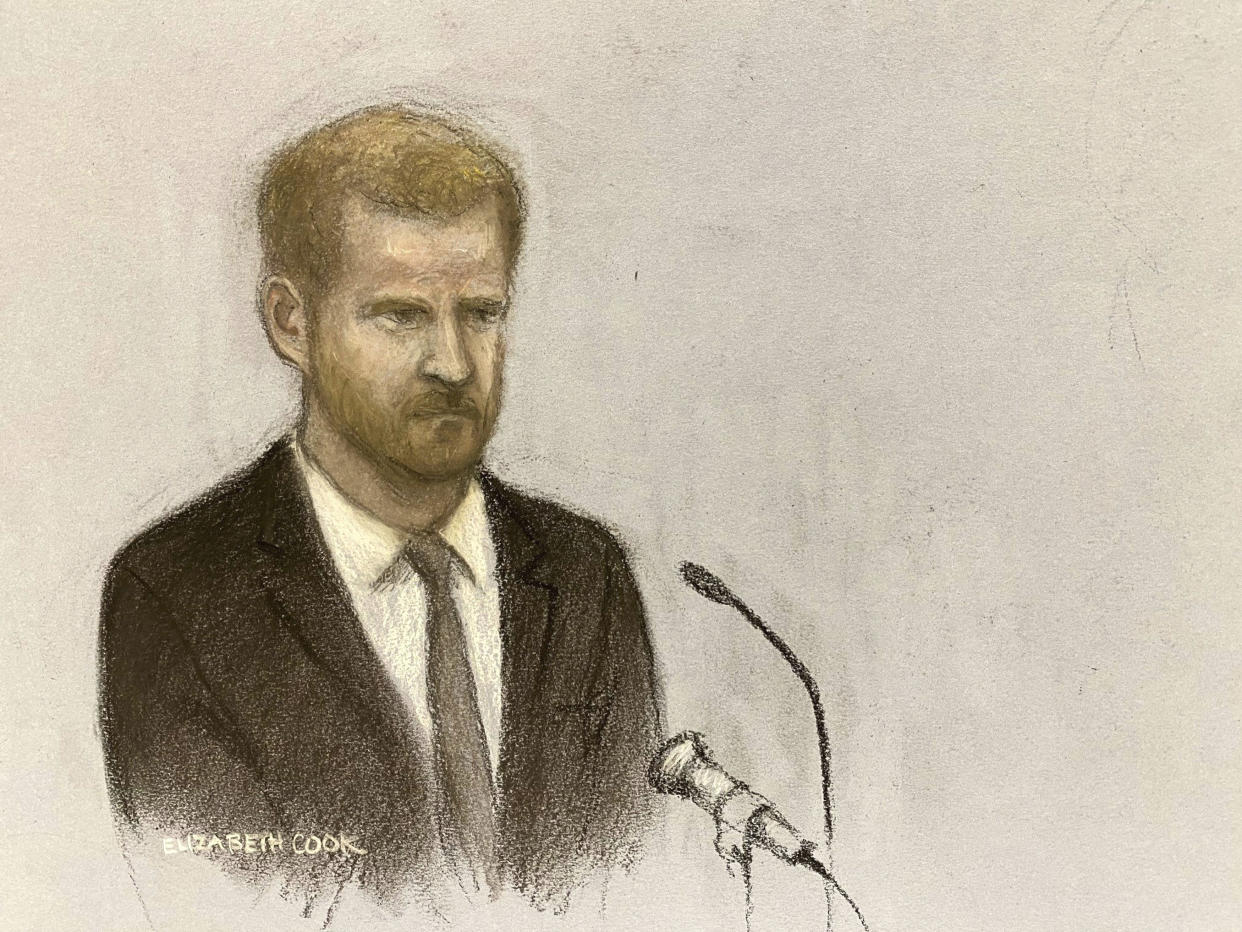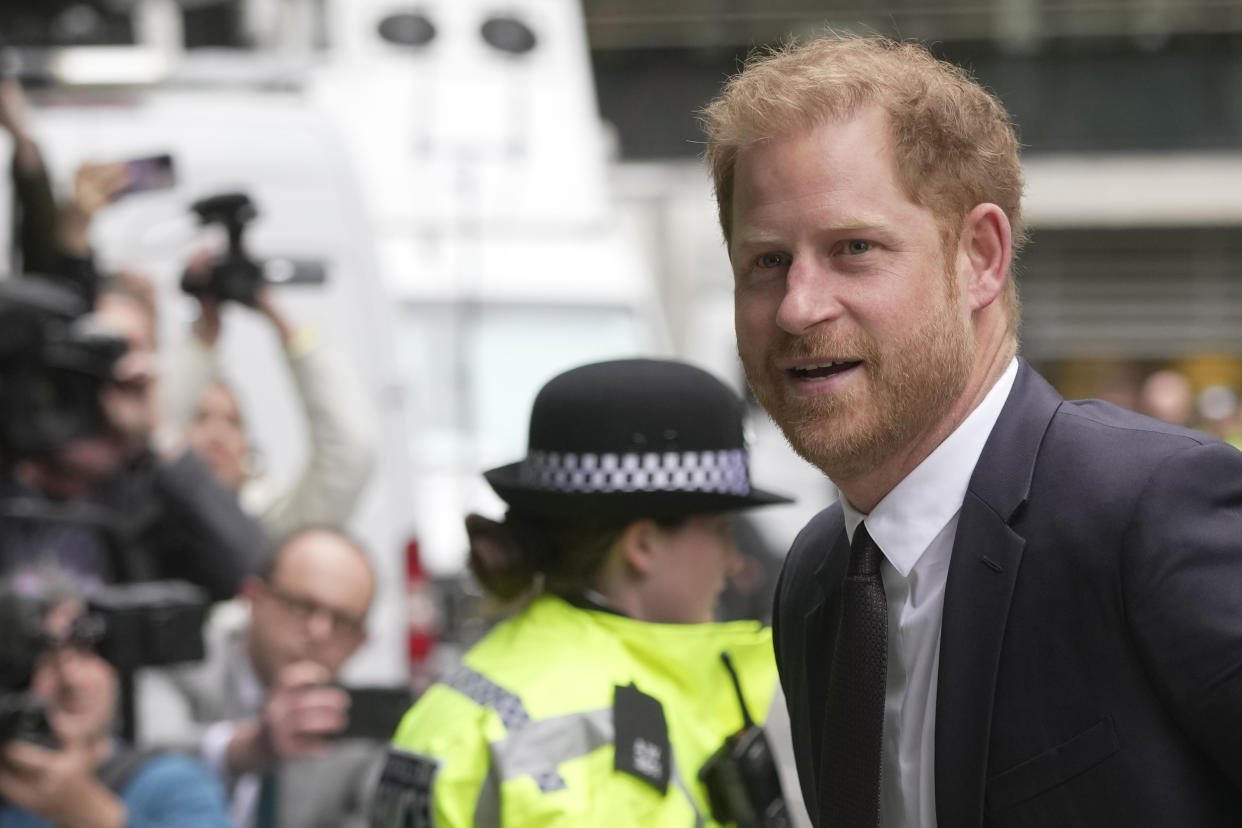Prince Harry testimony takeaways: Tabloids caused 'distrust' with Prince William, Chelsy Davy split and more

Prince Harry made history in London’s High Court on Tuesday as the first senior royal to take the witness stand in 130 years.
King Charles III’s younger son is involved in a case against publisher Mirror Group Newspapers (MGN). The 38-year-old, and more than 100 others, allege that tabloid reporters from the U.K.'s Daily Mirror, Sunday Mirror and The People used illegal methods — including hacking voicemails from family and friends — to get information for stories between 1991 and 2011. MGN has previously admitted to printing stories based on phone hacking, but denied hacking Harry's phone. Harry's is a test case — one of four — and if he and the other claimants win, the judge will use those cases to set the level of damages that MGN would pay.
Harry, who stepped down as a senior royal in 2020 and relocated to the U.S. with his wife Meghan Markle, took the stand on Tuesday, becoming the first British royal to do so since the 1890s. He testified that he "experienced hostility from the press since I was born." He said the tabloids played "a destructive role in my growing up," both personally and the way it impacted his late mother, Princess Diana. He said the alleged phone hacking made him paranoid and unable to trust people, and it impacted his relationships, including with his brother, Prince William, and then-girlfriend Chelsy Davy. It's also why he left the U.K., citing the "constant intrusion, inciting of hatred and harassment by the tabloid press into every aspect of our private lives," his detailed in a 55-page witness statement that was released on Tuesday.
Here are the biggest bombshells.
The alleged hacking hurt Harry's relationship with William
One of the 33 articles Harry claims contained unlawful information was one about a private dispute he and his brother had — over how to handle their late mother's former butler Paul Burrell, who kept talking to the press about her personal life. Harry said, "This sort of article seeds distrust between brothers" because what they thought was a private exchange was turned into tabloid fodder. Harry pointed to the quote in the story calling Burrell a "two-faced s***," admitting he believed he used the exact phrase in communication with William.
Harry wrote in his statement that he and his brother, with whom he now has a fractured relationship, "naturally discussed personal aspects of our lives as we trusted each other with the private information we shared." During that time, "We would often speak over the phone and regularly left voicemails for one another containing very private and sensitive information about our private, family and professional lives." It included discussions about "our personal relationships, education and careers [and] social arrangements." Now he's "aware that my brother was also a victim of phone hacking and unlawful information gathering." (William settled a hacking case out of court.)
Harry's attorney said Monday that the tabloid sowed "the seeds of discord between these two brothers."

Harry said hacking led to breakup with girlfriend Chelsy Davy.
Harry and Davy dated from 2004 to 2010, the majority of the time long-distance, relying on the phone for communication. "Naturally [we] spoke about all types of personal matters, including all aspects of our relationship and this was often through voicemail." He wrote, "We could also never understand how private elements of our life together were finding their way into the tabloids, and so our circle of friends became smaller and smaller." He said he had "bouts of depression and paranoia" over it, and caused "great challenges" in his relationship. He claimed the tabloids made 13 payments to investigators digging up Davy stories. "Ultimately, these factors led her to make the decision that a royal life was not for her, which was incredibly upsetting for me at the time."
Harry's attorney said in his remarks the day before that the never-ending coverage of Harry and Davy's relationship meant "they were never alone."
Harry's infamous Nazi costume was discussed
The attorney for the tabloid denied that Harry's phone was hacked for a story detailing a fight he had with Davy the night he wore the uniform to a party when he was 20. The article claimed that Davy "wasn’t happy at all," about the costume. While Harry claimed his phone must have been hacked to have that intel, the tabloid's attorney claimed the source for the story was Davy's uncle. Harry questioned whether the article author was truthful about the source.
Harry said Diana believed her phone was being hacked
Harry revealed that since he brought his case against the tabloid, he learned there were eight private investigator payments made in relation to his mother, which he said "makes me feel physically sick." Additionally, his legal team turned up evidence that he said shows his mother was being hacked related to communication she had at the time with TV personality Michael Barrymore, who was one of her friends. Letters she wrote detailed how she told nobody they were going to meet and yet stories popped up about with details of their private meetings. Diana wrote she was "horrified at the thought of Mr. Barrymore thinking that she had leaked the details." Harry wrote that he "can only assume that this information had been obtained via voicemail interception and/or other unlawful information gathering such as live land line tapping."
On the topic of his late mother, he also referenced an article on her visiting him at Ludgrove School on his 12th birthday, suggesting details about how long she spent there and how she "seemed to have been crying and looked stressed" wouldn't have been known to anyone else. He insisted, "It's my recollection that when my mother collected or visited me at school, she would be literally in and out of the front door of the school" with nobody "able to see my mother ... and establish that she was upset."

Harry accused Piers Morgan of waging "horrific personal attacks"
Harry called out the TV host, who served as editor at Daily Mirror for a decade, including the period in which he thinks Diana was being hacked. He wrote in his statement, "The thought of Piers Morgan and his band of journalists earwigging into my mother's private and sensitive messages (in the same way as they have me) and then having given her a nightmare time three months prior to her death in Paris, makes me feel physically sick and even more determined to hold those responsible, including Mr. Morgan, accountable for their vile and entirely unjustified behavior."
He added that Morgan — who quit his job on Good Morning Britain after claims he made about Harry and Markle's Oprah Winfrey interview — has subjected him and Markle to "a barrage of horrific personal attacks and intimidation" to this day "presumably in retaliation and in the hope that I will back down, before being able to hold him properly accountable for his unlawful activity towards both me and my mother during his editorship."
He questioned the tabloids pushing the James Hewitt paternity rumors
One of the long-running tabloid narratives around Harry was that Hewitt, not Charles, was secretly his father. "At the time, when I was 18 years old and had lost my mother just six years earlier, stories such as this felt very damaging and very real to me. They were hurtful, mean and cruel. I was always left questioning the motives behind the stories. Were the newspapers keen to put doubt into the minds of the public so might be ousted from the royal family?" It was upsetting to read how "highly-placed royal sources" were quoted anonymously in articles, and he said it led to a price on his DNA "for anyone who could obtain it" to determine the truth.
However, he later learned, that Diana had a relationship with Hewitt "after I was born." He wrote, "This timeline is something only learnt of in around 2014, although I now understand this was common knowledge amongst the Defendant's journalists."
Harry said his personal medical conditions became news headlines
He recounted how his glandular fever diagnosis, or mononucleosis, made the news with the 2002 headline: "Harry's sick with 'kissing disease.'" Not only was he embarrassed that the "whole country knew about my diagnosis" of an illness that had a "huge stigma attached to it when you’re a teenager," but he wasn't sure "how anyone outside of my immediate family knew" he had it. It left him feeling distrustful of his own doctors.
Harry feared he'd be expelled from Eton after reports that he was using drugs
When Harry was in college, he was "extremely worried" he would be expelled from the school following "purposefully misleading" press reports that he was using drugs. Pointing to a News of the World headline ("Harry's Cocaine Ecstasy and GHB Parties"), and listing its inaccuracies, he wrote in his statement that the claims in it had "a huge impact on my life. Eton had a zero drugs policy in place."
Another of the articles discussed was one about him being a "beach bum" during his gap year in Australia. He talked about being on a private holiday and suddenly a photographer showed up at a beach that wasn't busy or popular and photographed him. He said he was "unclear how anyone had known we were there" unless it was through unlawful ways.
He realizes in hindsight how his voicemails were hacked
Harry talked about getting a phone when he went to Eton, and he frequently didn't get messages. "I remember on multiple occasions hearing a voicemail for the first time that wasn't new,'" he wrote. While he passed it off as "a technical glitch ... or even just having too many drinks the night before and having forgotten that I'd listened to it," he recalled people frequently asking him if they he had received their voicemail when he hadn't or sometimes the new voicemail indicator would disappear before he listened to a message, suggesting someone else heard it first.
Harry said the violation left him with trust issues
He said the stories about him were "often wrong but interspersed with snippets of truth," which he claimed were gleaned from voicemail interception or unlawful information gathering. As a result, it created a "distorted version of me and my life to the general public," but it also "a huge amount of paranoia in my relationships." He was left feeling "that I couldn’t trust anybody, which was an awful feeling for me especially at such a young age."
He said the evidence disclosed by MGN in the case revealed its newspapers made 289 payments to private investigators for information relating to him and his inner circle. He said his phone number was in a contact list belonging to "prolific hacker and head of news at the Sunday Mirror," Nick Buckley. He now realizes "that my acute paranoia of being constantly under surveillance was not misplaced after all."
